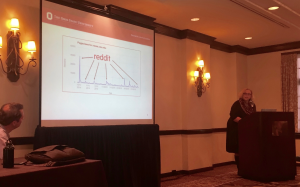By Alison F. Takemura
Reddit has a reputation. The Internet message board offers categories, or subreddits, that span the human experience, including interests "you don’t want to know exist," said Pam Frost-Gorder, assistant director of communications at Ohio State University, at a ScienceWriters2016 session Oct. 29.
But for all its potential unsavoriness, Reddit is a powerful social media platform — one capable of reaching thousands of potential readers. Analyzing data from 2014 and 2015, Frost-Gorder saw clear spikes in page views on certain days. The traffic, she discovered, was because of Reddit.

Writers can contribute two types of content, explained Allen and Jennifer "Piper" Below, the other volunteer administrator of /r/Science and a geneticist at the University of Texas Health Science Center in Houston. Once a writer is a registered Reddit user, she can make a post that links to a news story. Alternatively, she can organize a "crowd-sourced" Q&A session — as Below put it — called Ask Me Anything, or an AMA. A journalist might coordinate one for himself as the interviewee, or a PIO might organize one for a scientist at his or her home institution. Anyone delivering an AMA would be in good company; hundreds of individuals have done it, including Temple Grandin, George Church, and Stephen Hawking.
Science journalists looking to post articles they’ve written do need to abide by some rules, though, Allen said. For one, they should use their real names and affiliations. That makes clear who’s posting or promoting stories. Second, posts shouldn’t sensationalize. Headlines need to reflect the scope of a study, such as whether it was done in a mouse model. Third, posts should relate to coverage of studies published in the last six months and reference the original journal article on which they’re based. (While /r/Science isn’t the right venue for features, such pieces fit at the sister subreddit /r/EverythingScience.)
Allen explained how to set posts up for success. "Posting time is almost more important than anything else," he said. He recommends 7 a.m.: "People look for new content while they’re eating their Lucky Charms." The more eyes on a post, the more up-votes it can get early on, which contributes heavily to its popularity ranking.
But for Below and Allen, /r/Science is not just about generating views for a news article: It’s a way of connecting to readers. So, they have another important rule: "You can’t just dump the link and walk away," Allen said. "That’s spamming. If you’re interacting in the comments and answering questions about your story, then you’re part of the community."
Like posts, the AMAs are all about this give and take — but in a two-hour event format. The site hosts about one to three a day and they’re usually scheduled weeks in advance. For AMA sessions, interviewees post short biographies about what they do and why, prompting Redditors to submit questions. Those that get the most up-votes rise to the top of the list.
Frost-Gorder of OSU urged the audience to get comfortable with Reddit before they dive into organizing an AMA. For example, after setting up a personal account, she said, "I earned some good karma" — the site’s social currency — "mostly from the slowcooker subreddit."
That familiarity with Reddit helps when reassuring scientists they can do an AMA, she said. "I tell them it’s like … giving a presentation at a very generalized kind of conference," Frost-Gorder said.
Below also explained that an invisible army of sub-moderators, or users verified to have some expertise in scientific fields, are able exert quality control by deleting irrelevant questions. "Every single question is appropriate, polite and on-topic," Below said. "There's no real fear of having to face the Internet trolls of the seedy underbelly of Reddit."
Frost-Gorder makes it as easy as possible for scientists to do an AMA. She tells them all they need to do is write their biographical sketches and show up to answer audience questions. She gives them the comprehensive and reassuring guide provided on the site. And during the AMA, she or a colleague will even help streamline the process by typing out the answers as the scientist dictates, with the scientist checking for accuracy before the response goes live.
Responses often beget more follow-up comments and questions. "And, many times, investigators will continue to answer questions throughout these threads," Below said, "so it becomes truly a two-way, live interactive conversation directly with the scientist."
Frost-Gorder and OSU have hosted five AMA’s so far, and in each, the scientist has enjoyed the experience, she said. "Many of them have even wanted to stay on after the two hours was up."



